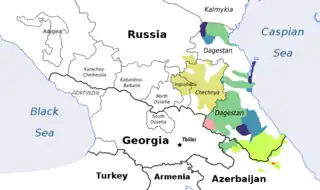Tsezic languages
The Tsezic languages (also called Didoic languages) form one of the seven main branches of Northeast Caucasian language family. It branches into Tsez–Hinukh and Bezhta–Hunzib–Khwarshi, according to research published in 2009.[1] They were formerly classified geographically into East Tsezic (Hinukh, and Bezhta) and West Tsezic (Tsez, Khwarshi, and Hunzib). The Avar language serves as the literary language for speakers of Tsezic languages.
| Tsezic | |
|---|---|
| Geographic distribution | Southwest Dagestan |
| Linguistic classification | Northeast Caucasian
|
| Glottolog | tsez1239 |
 Tsezic | |
Internal branching
Schulze (2009)[1] gives the following family tree for the Tsezic languages:
- Tsez–Hinukh
- Bezhta–Hunzib–Khwarshi
Figures retrieved from Ethnologue.[2]
Kassian and Testelets (2015) do not consider Tsez and Hinukh to form a distinct subgroup.[3]
References
- The Languages of the Caucasus, by Wolfgang Schulze (2009) Archived 2017-09-18 at the Wayback Machine
- Ethnologue
- Алексей Касьян, Яков Тестелец. Филогения цезской языковой группы: лексикостатистика и грамматические инновации. X традиционные чтения памяти С. А. Старостина, РГГУ, Москва, 27 марта 2015 г.
This article is issued from Wikipedia. The text is licensed under Creative Commons - Attribution - Sharealike. Additional terms may apply for the media files.
